#Fulgencio Batista
Explore tagged Tumblr posts
Text
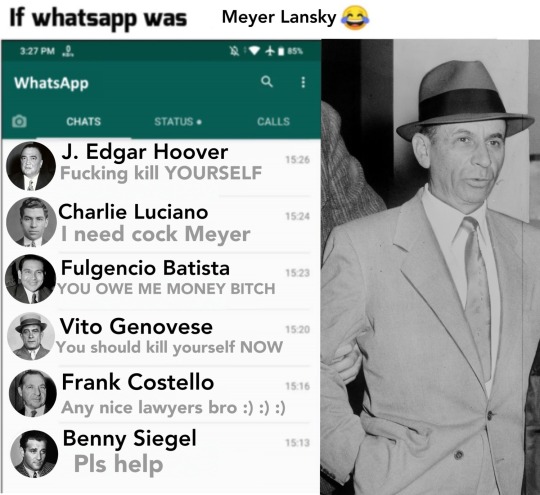
#meyer lansky#j edgar hoover#charlie luciano#fulgencio batista#vito genovese#frank costello#benny siegel#whatsapp meme
39 notes
·
View notes
Text
VEINTE AÑOS SIN CABRERA INFANTE
En el 20 aniversario de la muerte de Guillermo Cabrera Infante el 21 de febrero de 2005, recupero dos reseñas que dediqué a sus dos pasiones, la literatura y el cine TRILOGÍA DE LA HABANA La última novela de Guillermo Cabrera Infante, su primera obra póstuma, viene a completar su mirada de exiliado sobre la capital de Cuba, una mirada iniciada con Tres tristes tigres (Seix Barral, 1967) poco…
#Alberto Korda#Brigitte Bardot#Cabrera Infante#Che Guevara#Fidel Castro#Fulgencio Batista#Maurice Ravel#Miriam Gómez#Néstor Almendros#Roger Vadim#Sabá Cabrera
1 note
·
View note
Text
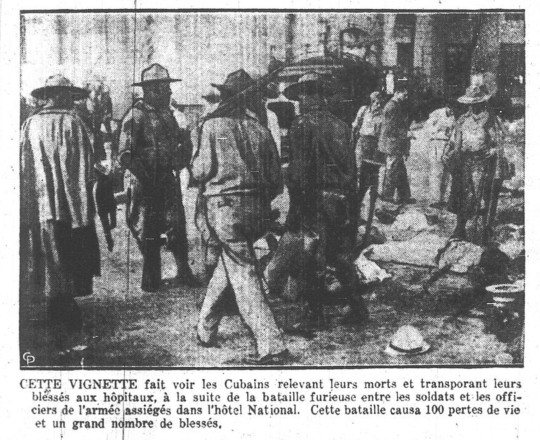
"CETTE VIGNETTE fait voir les Cubains relevant leurs morts et transporant leurs blessés aux hôpitaux, à la suite de la bataille furieuse entre les soldats et les officiers de l'armée assiégés dans l'hôtel National. Cette bataille causa 100 pertes de vie et un grand nombre de blessés." - from L'Illustration (Montreal). October 7, 1933. Page 1.
#havana#battle of the hotel nacional de cuba#revolución cubana de 1933#revuelta de los sargentos#siege#armed revolt#cuban history#cuba#interwar period#the great depression#fulgencio batista
0 notes
Text
13 mars : les prémices de la révolution cubaine
Le régime cubain célèbre le 65e Anniversaire de l'attaque du palais présidentiel (Aniversario del ataque al palacio presidencial) en 1957. Une opération ratée qui a tourné au désastre. Le 13 mars 1957, des attaques simultanées ont été lancées contre le palais présidentiel (devenu aujourd’hui le musée de la révolution) et les locaux de Radio Reloj. L’objectif était d’assassiner le dictateur Fulgencio Batista et de lancer un appel au soulèvement populaire depuis la radio.
Cette opération a été menée par un groupe de jeunes révolutionnaires conduits par José Antonio Echeverría. Ils formaient un commando de 50 hommes armés qui a pris d’assaut le palais présidentiel tandis que José Antonio Echeverría investissait les locaux de la radio avec une quinzaine d’hommes. L’opération est un échec : Batista parvient à s’enfuir et la transmission radio est coupée en plein milieu du discours de José Antonio Echeverría sur Radio Reloj. Un grand nombre d’assaillants est tué pendant l’attaque.
Quant à José Antonio Echeverría, il trouve la mort dans un accrochage avec la police près de l’Université de La Havane après avoir quitté les locaux de Radio Reloj. La voiture dans laquelle il circulait a été interceptée par un véhicule de police à côté du campus universitaire et le chef étudiant est décédé mitraillé, il n’avait que 24 ans. Lui vivant, peut-être que Fidel Castro n’aurait eu qu’un rôle de second plan dans la suite de l’histoire.
Un article de l'Almanach international des éditions BiblioMonde
0 notes
Text
And yes, Fulgencio Batista very much does count:
While he's mostly famous for losing to Fidel Castro these days, Batista was, ironically, a product of Black Cuban history where Fidel was very much lily-white Spanish. Fidel, in fact, was literally the son of a rich Spanish officer so far more Simon Bolivar than anything else. Batista, equally, was a much more opportunistic ruler than Castro was, having the main principle of swelling his own coffers and being utterly unscrupulous as to how he went about it. Which was why when he orchestrated the coup that took him to power and ended democracy in Cuba, such as it was, for the duration he spent that time as a beloved darling of the United States.
In reality it was PRECISELY for being such a beloved darling of the United States that Castro in turn would manage to overthrow him, and the longer-term effects of that are left for tomorrow with the main focus on Cold War Africa, not least because the USSR very happily treated Cubans as modern Russia does Chechens and Baikal Mongolians and sent them to die for it so no Russians died while they revenged themselves on Castro trying to start WWIII and throwing a temper tantrum when Moscow refused to set the world on fire for his sake.
There was also more than a bit of animosity from the lily-white Spaniard and the mixed-race Black general who embodied all the corrupt traditions of the old Cuba in Castro regime propaganda and beyond that there was at least some truth to it in reality. Like Idi Amin Batista is one of those cases where influential and good or benevolent are very far from synonymous.
#lightdancer comments on history#black history month#american history#cuban history#fulgencio batista
0 notes
Text
“¡Señores, esto se acabó!”: la noche que Fulgencio Batista huyó de Cuba y le dejó el camino libre a Fidel Castro
Las horas finales del dictador cubano tuvieron ribetes insólitos. La fiesta que dio el 31 de diciembre por la noche y cómo dejó plantados a sus invitados para escapar. La situación económica de Cuba en el momento de la revolución. La carta del Che Guevara para romper con su primera esposa. El rol del embajador de los Estados Unidos. Y la extorsión del dictador dominicano Trujillo para dejar salir…
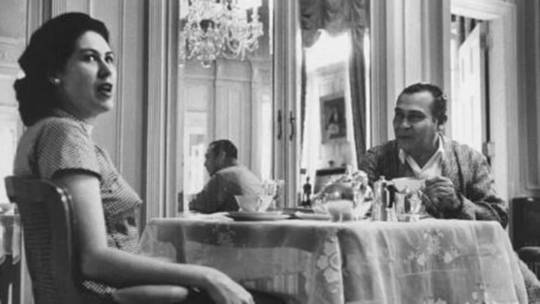
View On WordPress
0 notes
Text
De peperbus van nonkel Miele (60): 65 jaar Cubaanse revolutie
Maandag 1 januari 2024 vieren miljoenen Cubanen de 65e verjaardag van hun revolutie. Zoals gebruikelijk zal het nieuwe jaar 2024 en het revolutionair jubileum op oudejaarsavond worden begroet met 21 saluutschoten. Naast tal van activiteiten door het hele land, vindt er een centrale viering plaats in het Céspedes Park in de stad Santiago de Cuba. Daar kondigde de revolutionaire leider Fidel Castro…

View On WordPress
1 note
·
View note
Text
Fidel Castro: A Jornada de um Ícone da Revolução Cubana e seu Impacto Duradouro
Fidel Castro: A Jornada de um Ícone da Revolução Cubana e seu Impacto Duradouro A história de Fidel Castro é uma saga que se inicia em origens modestas e culmina em uma liderança revolucionária marcante. Neste artigo, exploraremos a vida de Fidel Castro, desde sua infância até sua transformação em um líder icônico da Revolução Cubana, destacando seu impacto duradouro na história e sociedade…

View On WordPress
#Assalto ao Moncada#Ángel Castro#Cuba#Despertar Político#família de Fidel#Fidel Castro#Fulgencio Batista#IAs#Infância de Fidel Castro#Influência da mãe de Fidel#inteligências artificiais#irmãos de Fidel Castro#Laços Familiares na Revolução#mãe de Fidel Castro#Movimento 26 de Julho#Origens de Fidel Castro#Política#Raúl Castro#Revolução Cubana
0 notes
Text
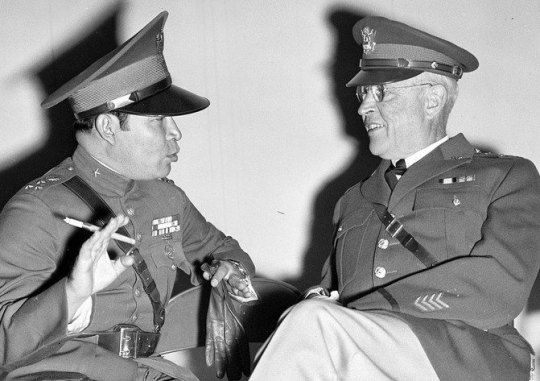
Fulgencio Batista y Zaldívar. And his giant hat.
3 notes
·
View notes
Text
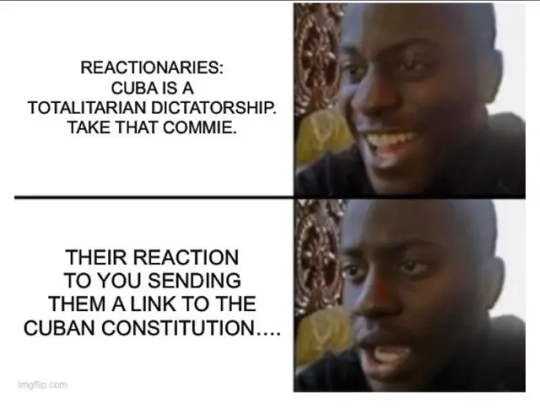
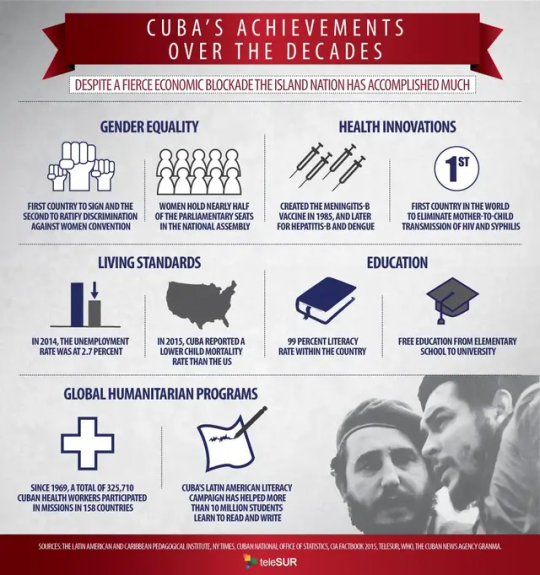
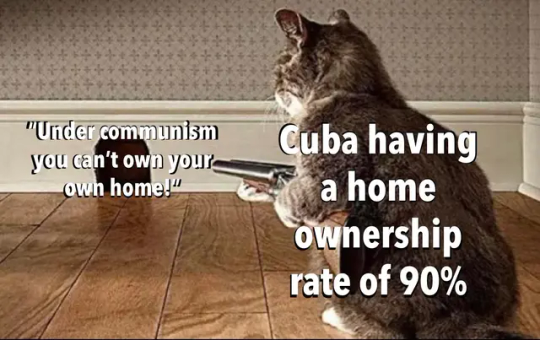
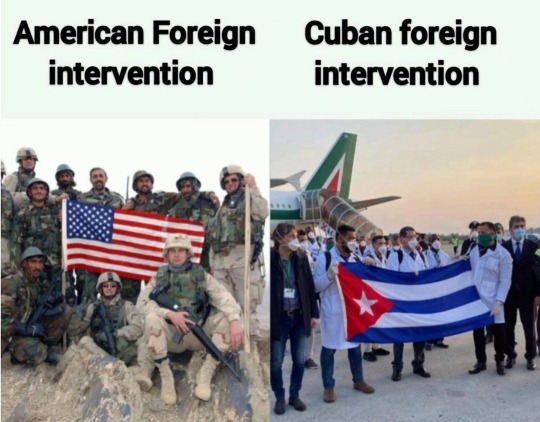
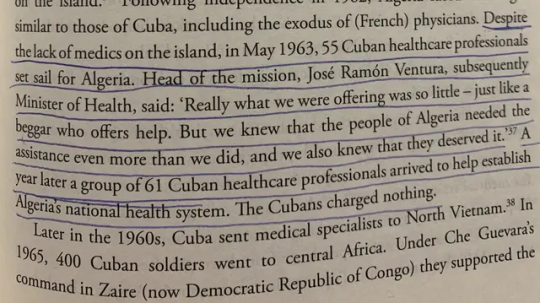
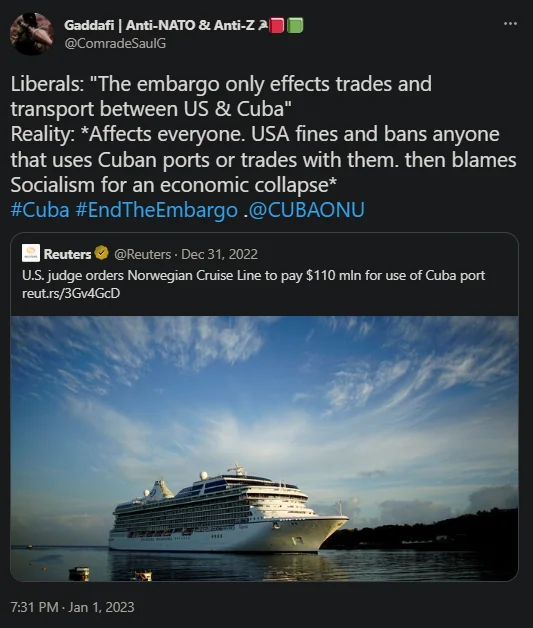
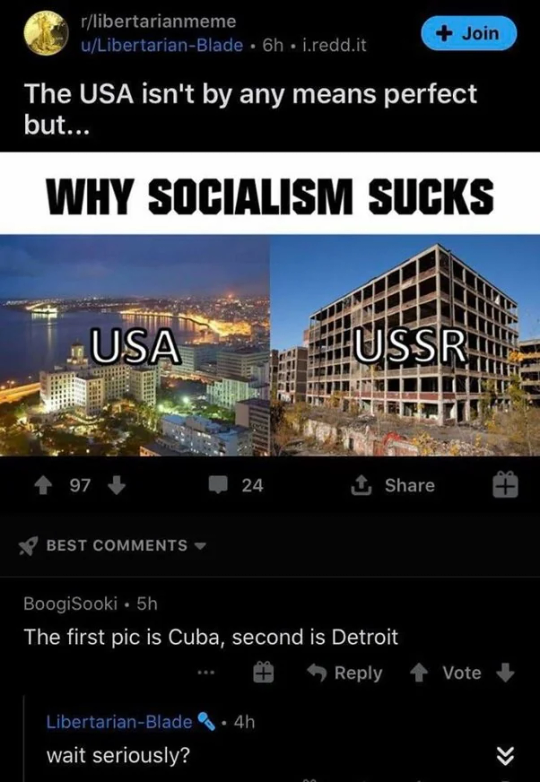


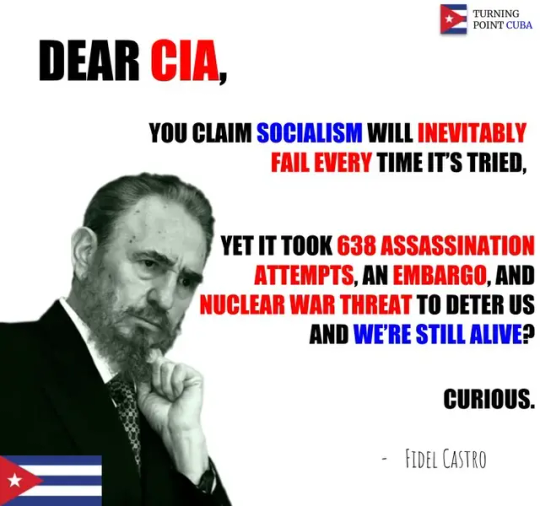
Today is the 26th of July, 2024, exactly 71 years since the failed assault on the Moncada barracks in Santiago de Cuba. This failure would later be commemorated by Fidel Castro and his vanguard revolutionary movement as their very name, the name with which they won independence for Cuba from its dictator, Fulgencio Batista, and it's imperial overlord, the United States.
Cuba is still not free, however; crippling US sanctions have hindered its development, stressed their society, and needlessly taken lives. This embargo, now in its 65th year, must end. If you live in the United States, you bear a special responsibility to use every means of pressure, collectively, to pressure your government and your ruling class to end this embargo and finally free Cuba.
264 notes
·
View notes
Text
Reinaldo Arenas was a member of the Cuban Revolution. Born into poverty, he joined the movement at the age of sixteen with hopes of overthrowing Cuba’s ruler, Fulgencio Batista. He believed that he was aiding in transforming his country into a place of freedom and peace for all. While the revolution began to gain support and power, however, Arenas slowly became disillusioned. Reinaldo was a gay man, so the freedom the revolution promised was not meant for him.
Support Making Queer History on Patreon
Send in a One-Time Donation
#reinaldo arenas#queer history#queer#lgbt#lgbt history#gay history#making queer history#cuban history#cuba
258 notes
·
View notes
Text
DELIA FIALLO Y LA CULTURA DE MASAS
En el centenario de la más popular guionista de telenovelas Francisco R. Pastoriza Mario Vargas Llosa dijo en una ocasión que la escritora asturiana Corín Tellado fue probablemente el fenómeno sociocultural más notable que haya experimentado la lengua española desde el Siglo de Oro. No lo decía por la calidad literaria de sus novelas sino por su influencia en la manera de sentir,…
#Cabrera Infante#Corín Tellado#Delia Fiallo#Fidel Castro#Fulgencio Batista#Hugo Chávez#Rómulo Gallegos#Vargas Llosa
0 notes
Text
Cuba broke through its colonial domination into freedom. From the mountains of the Sierra Maestra and from the cities came the torrential power of the people against the US-backed dictator Fulgencio Batista. ‘The revolution is made in the midst of danger’, said Fidel Castro as he led his band of peasant-soldiers from the hills into the cities. They had triumphed against remarkable odds. Quickly, the revolutionaries passed a series of decrees – just as the Soviets had – to draw the key classes to their side. To draw in the urban Cubans, the revolutionaries cut rents by half – sending a strong signal to the bourgeoisie that they had a different class outlook. Then, the revolutionaries took on the United States, whose government held a monopoly over services to the island. Telephone and electrical companies – all American – were told to reduce their rates immediately. Then, on May 17, 1959, the Cuban government passed its agrarian reform – the keystone of the revolutionary process. Land holdings would be restricted so that no large landowners could dominate the landscape and so that the US sugar industry could not strangle the hopes of the island. The most radical part of the reform was not the land ceiling itself, but the logic that agrarian reform would transform the stagnation of the Cuban economy and its dependence upon the United States. The law clearly stated that, from a socialist standpoint,
«The agrarian reform has two principal objectives: (a) to facilitate the planting or the extension of new crops with the view of furnishing raw materials to industry, satisfying the food requirements of the nation, increasing the export of agricultural products and, reciprocally, the import of foreign products which are essential to use; (b) to develop the interior market (family, domestic) by raising the purchasing power of the rural population. In other words, increase the national demand in order to develop the industries atrophied by an overly restrained consumption, or in order to create those which, for lack of customers, were never able to get started among us.»
The revolutionaries wanted to diversify their sugarcane island, produce food security for their people, remove people from desperation, increase the ability of people to consume a range of goods and engineer a people-centred rather than an export-centred economy. Long before Castro announced his commitment to communism, the regime had already developed a carefully thought out socialist platform.
The United States of America, having overthrown the radical nationalist government in Guatemala in 1954, was eager to repeat the task in Cuba in 1959. An embargo came swiftly, as did every form of humiliation possible against the Cuban people. The Cuban economy was structured around dependency to Washington, with the sugar bought by the US firms and with the island turned into a playground for American tourists. Now, the US decided to squeeze this little island, only ninety miles from the US shoreline. Gunboats were readied, a failed invasion tried in April 1961 at the Bay of Pigs. Cuba was vulnerable but also protected by the deep roots of its revolution. But would this protection be sufficient? Could Cuba, alone, be able to survive the onslaught from the United States?
On February 5, 1960, a leader in the USSR and an Old Bolshevik – Anastas Mikoyan – came to Havana to join Fidel Castro at the opening of a Soviet scientific, cultural and technical exhibition. A week later, Mikoyan and Castro signed an agreement for the USSR to buy Cuban sugar at the world market price (in dollars) and provide credits for the Cubans to buy Russian goods. The USSR would subsequently buy almost all the Cuban sugar harvest, even as the Russian consumer market could very well have been supplied by beet sugar from within the USSR. Prices fluctuated, but, on balance, the Cubans were able to find a regular buyer to take over from the United States. The Russians also provided over a $100 million in credits toward the construction of Cuba’s chemical industry as well as trained Cuban technical and scientific workers in the USSR. Diversification of Cuba’s economy remained on the cards, although it became clear that it would not be an easy task. In August 1963, Castro announced that diversification, as well as industrialization, would be postponed. Cuba needed to concentrate on its sugarcane harvest to earn the means to survive the embargo.
On February 24, 1965, Che Guevara addressed the Second Economic Seminar of Afro-Asian Solidarity in Algiers, Algeria. He had come to talk about the economic problems for a revolution in a post-colonial country. Overthrowing the former colonizer was not enough, Che said, since ‘a real break’ is needed from imperialism for the new state to actually flourish and not remain in dependency. How could the post-colonial state survive a hostile economic climate? Who would buy its goods – mainly primary, unprocessed goods – at a fair price, and who would lend it capital at fair terms to develop? Capitalist banks and countries would not provide the post-colonial state, particularly a socialist state, with the means to break out of the trap of underdevelopment. Banks would lend money to a post-colonial state at rates higher than it would lend to a colonial power. Expensive money would only put the post-colonial state into further difficulty, as it would find it hard to service its debt and see its debt multiply out of hand. To prevent this situation, Che argued, the ‘socialist countries must help pay for the development of countries now starting out on the road to liberation’. Trade between socialist countries must not take place based on the law of value of capitalism, but through the creation of fraternal prices. ‘The real task’, Che said, ‘consists of setting prices that will permit development. A great shift in ideas will be involved in changing the order of international relations. Foreign trade should not determine policy, but should, on the contrary, be subordinated to a fraternal policy toward the peoples.’
China, in 1960, offered Cuba credit of $60 million without interest and without a timeline for repayment. This was an enviable loan. But the scale was much smaller than the Soviet assistance. By 1964, the USSR had provided Cuba with economic assistance valued at over $600 million, while the Eastern European countries offered several hundred million more in aid and assistance. The USSR had also trained over 3,000 Cubans in agronomy and agricultural mechanization as well as 900 Cubans as engineers and technicians. Che recognized the value of the Soviet ‘fraternal policy’ both in terms of the training and in the prices offered. ‘Clearly, we could not ask the Socialist world to buy this quantity of sugar at this price based on economic motives’, he had said in 1961, ‘because really there is no reason in world commerce for this purchase and it was simply a political gesture’.
Red Star Over the Third World, Vijay Prashad, 2019
95 notes
·
View notes
Text
Did Fat Joe show his Whole Hand?

Safe to say that Jose Cartagena has been an outspoken HipHop Revisionist. In recent Years, Joe along w/ John Leguizamo & Crazy Legs have been offering their narrative on who created HipHop Music & Culture. The Pioneers have stepped to the Mic & set The Record straight on WHAT happened, WHEN it happened, & WHO was there. Fat Joe, like KRS One is caught in a contradiction. Kris is actually 'Of The Culture', so he has a Lane available to say: mea culpa & come back into the Fold. Joe on the other hand, didn't respect his place as a Guest in the House of HipHop- as a result, he's getting his privileges revoked. I appreciate the degree that Joe chose to Stand on his Square, because it reminded many of Us of previous Bad Behavior.
In his Barbershop interview w/ Math Hoffa, Fat Joe had a few cringe moments. He disrespected Lord Jamar by saying that he was a 'Looney Tune looking to go viral', & called him the 'wackest member of Brand Nubian'. That said, his most cringe worthy statement had to be referring to FBA as a 'Radical Black Hate Group' that only wants to associate w/ their Own. He defined FBA as: 'Foundational Black Authority', & called Our Lineage 'a bunch of broke N-s'... Black Alpha, Lord Jamar, Phil Scott, & Jason Black were among the first to respond; All pointed out his White Supremacist Talking Points. If we're being honest, Joe sounded like a straight up Conquistador.
As We come to the End of Our 'Year Of Affirmation', We find Ourselves Standing firmly on Our Convictions & calling out ANYONE that questions them. Fat Joe, like many others who were allowed access into Our Culture are discovering an unexpected Reality- Houseguests don't get House keys. These Folks have been given so many passes over so many Years, that they actually believe that they KNOW Us. This is the same Story, from Michael Rappaport to Drake & Cardi B. Fat Joe's tantrum was ill timed; Our Collective Antennas were up, & Everyone heard the same language. Black Alpha in particular, pointed out how Joe wasn't even talking about HipHop anymore... This thing has many layers.
We all see that this attitude towards Indigenous Black Americans is nothing new. We know the History of the Immigrant Experience in America; the Ethnicity changes, but their actions are too similar to just be a coincidence. We saw it w/ the Irish, Italian, & Eastern European (Slav & Askenazi); now We see it w/ 'Black & Brown' Immigrants. The Black- Latino Dynamic is complicated, because Hispanic/ Latino Culture is rooted in Colorism (Blanqueamiento). Their Society is divided by how close one is to their 'Castilian Roots'. How does someone aspire to Whiteness in an Area where folks are 'Black & Proud'? When We look at Latin American Leaders like Fidel Castro & Hugo Chavez, who touted their Afrikan Roots & included Afro- Latinos in the Body Politic, We see how they were demonized as Bad Men.
ALL of their predecessors kept the Afro- Cuban & Afro- Venezuelan Population in a State of Poverty & Oppression. It's clear that the 'Blanco' contingent preferred the leadership of Fulgencio Batista (Zaldivar), Ramon Jose Velasquez, & Rafael Caldera Rodriguez. We need to look no further than Miami, where folks like Gloria Estefan are STILL lamenting the Cuban Revolution. Fat Joe glossed over 'Radical Puerto Rican Extremists' as he focused on FBA, but can We call it 'Extremist Behavior' when The Majority of The Population practices it at Home, & bring it w/ them when they Immigrate Here? Black People aren't respected in Hispanic/ Latino Culture, they're victimized. Latino Police Officers can be more Anti- Black than Irish & Italian Officers; certainly more aggressive towards Blackfolk. Again, Joe is silent on this Note.
As I said, this thing has layers. In the same way that Great Britain left the door open for America to step in & assume the role of Dominant World Power; AmeriKKKa is leaving the door open for Hispanics/ Latinos to hold the reins of Power over Black America- as long as they acknowledge their Position in White Supremacy. In the same manner that Whitefolk & Azkenazis assumed Ownership of Jazz, Big Band, Country, & Rock N Roll; Latinos think that they can assume Ownership of HipHop. They were successful in taking 'Tango' from the Afro- Argentinians that created 'The Forbidden Dance', but We're a Lineage of Fighters! If we're being honest, We have to acknowledge how the Latino influence on HipHop has done more harm than good. Stand Outs, like Mantronix & Immortal Technique are revered as Legends in The Game. Super Lover Cee & Casanova Rud also deserve an honorable mention. Now I could be wrong, but I haven't heard ANY of them side w/ Fat Joe.
Joe has been on many Platforms trying to push his narrative. He has emboldened other Puerto Ricans (Nuyoricans) to chime in on 'Out Of State' Cats speaking on something that started in NYC. Content Creators point out how HipHop may have been BORN in NYC, but was CONCEIVED in The South. Jason Black & Black Alpha point out the cultural differences between Us & Non ADOS/ FBA Communities, & how little they know about Our Lineage. First off, the Slave Experience in AmeriKKKa affected Us differently than it did those in Latin America & the Caribbean. While they exhibit Tribalism & Colorism, We exhibit Unity. From the East Coast to the West Coast, & from the Great Lakes to the Gulf- Blackfolk are an Extended Family. Those of Us in the Northeast & Out West tout Our Southern Roots like a Badge of Honor. We are the Descendants of those who survived AmeriKKKa's Killing Fields. Immigrants don't have that experience, & therefore can't truly understand what motivates Us Culturally.
Another clear cultural difference between Us & Non ADOS/ FBA Ethnicities, is how We deal w/ White Supremacy. We have a Global Reputation of fighting White Supremacy, no matter where it exists. As a Collective, Immigrant Groups tend to be Anglophiles; They aspire to Whiteness. They 'Get In where they Fit In', & that classically means harboring Anti- Black Sentiment. Fat Joe & Busta Rhymes aren't exceptions, but typical examples of how these people move. They Rock w/ Us- copying Our 'cultural mannerisms', until they get a 'Come Up'; then they shift to White Supremacist Talking Points & Anti-Black Sentiment. Busta thought he 'Made It', & began an onslaught of disrespectful opinions regarding Black America. He began w/ disenfranchising Blackfolk from HipHop, & went on to say that 'American Culture' comes from Latin America & The Caribbean. The Man had a much anticipated World Tour scheduled, but the backlash from ADOS/ FBA has led to Investors pulling out & the Tour being Canceled. This Tour was supposed to solidify Busta's Legacy, but he's been reduced to doing a wacky Walmart Commercial... Safe to say that he made a misstep.
As bad as Busta has been, Fat Joe has been worse. He admits that he's "the product of The Product", but somehow believes that he knows about Events that happened before he was born. His arrogance has revealed an Anti- Black Racist sentiment that is pretty common among his people. Content Creators have pointed out Joe's excessive use of The N- Word, & how he ignored pleas from his Fans to stop using it. As a Native New Yorker who spent his Formidable Years in Spanish Harlem, then lived in Bushwick for 4Yrs & Inwood for 5Yrs- I can say w/ certainty that NO ONE uses the N- Word more than Hispanics/ Latinos. Dominicans top The List, but Puerto Ricans & Cubans aren't far behind them. Caribbean Folk are also pretty frequent w/ their use of the N- Word; is it a coincidence that many of the Rappers spewing this word aren't from 'The Soil''? Regardless, what We are witnessing, is a clear effect of Delineation. As We Circle Our Wagons, the Opportunists (i.e. Tethers) are getting nervous. They depend on Us believing in 'Coalitions' that benefit them to Our detriment. Times have Changed! These folks no longer have Us to lean on for Financial, Social, or Political Support. Since these people believe they're Superior to Us, they should have No Problem w/ Going it Alone in the 'Wilderness of North America'.
-As I said before, They better get used to The New Normal.
#B1#ADOS#FBA#FreeMen#Indigenous#The13Percent#AfricanDiasporaNetwork#BlackAlphaNetwork#TheBlackAuthority#TheGodPod#GatekeepingTheCulture#BootlickMarginCall#ColonizerJoe#BussyBuss#OnCode#TheCulture#AgeOfProphecy
22 notes
·
View notes
Text
Just wanted to take the time to go on a little rant here.
Lately I've been seeing people (my family 😭) throwing around common propaganda out about Fidel Castro so might as well discuss some of it.
- "Fidel had wanted to attack the United States unprovoked" this claim comes from the events of the Cuban Missile Crisis, but its a claim that's been debunked before and after the crisis happened. Fidel had made it very clear throughout his entire life before and after his political career that he was not fond of the United States, although in the beginning he was willing to have peaceful cooperation with them and had some admiration in his younger years (like in his letter to FDR) but as time passed he knew clearly that the US would only be interested in cooperation if it meant that Cuba would become aligned with the exact policies of the US that Fidel made it clear he was against, which Fidel would obviously not accept so cooperation failed as a result of the US. This along with other instances that the US would plot against Fidel like the Bay of Pigs Invasion or the numerous assassination attempts on his life, eventually caused the Cuban Missile Crisis. This means that Fidel only acted out of retaliation to being attacked first by the United States.
- "He suppressed the rights of the Cuban people" this claim likely comes from defectors and the persecution of LGBT people in Cuba. The Cuban Revolution had sought to expand the rights of the people. In order to understand that one should be aware of the state of Cuba prior to the revolution, due to the March 10th coup d'etat which placed Fulgencio Batista in power in the country, he saw that Cubans especially minorities like Afro Cubans had restricted freedoms and opportunities. The Cuban Revolution had sought to change this and ensuring the rights of minorities in Cuba is something that was in large part a success and also a process still ongoing today. For the latter part of the argument, the claim that Fidel had purposely persecuted LGBT people, although unfortunately yes LGBT people were persecuted in Cuba under Fidel, however he did not know of it and stopped it as soon as he had learned of it in 1979. Later in 2010 several years after he stepped down and several years after LGBT people had gotten their rights further expanded, Fidel not only took further accountability for what had happened to the LGBT community but also had explained that because the US was constantly plotting against him at the time these persecutions were happening, he could not pay proper attention to them which is why he stopped it as late as he did.
- "Fidel ruined the Cuban economy" This likely comes from Cuba's poor state economically speaking, which is a result of US policy. To further explain, immediately after the Cuban Revolution, Fidel had started immediately making social changes to the country like agrarian and land reforms, seizing of private businesses, ect. which had gone directly against the path the US wanted the revolution to go. As a result the US had placed heavy economic sanctions and a trade embargo on the country meaning nothing can go in or out from the US, and a heavy fine would have to be paid otherwise. Naturally this damaged the Cuban economy but despite this Cuba still stands strong against the US, they have world renowned healthcare, long life expectancy, and many services in the country are free of cost despite the embargo. Because of this resilience Cuba can still stand with the revolutionary government regardless of what the US has done to them.
Guys i MIGHT be interested in Fidel idk 😣😣
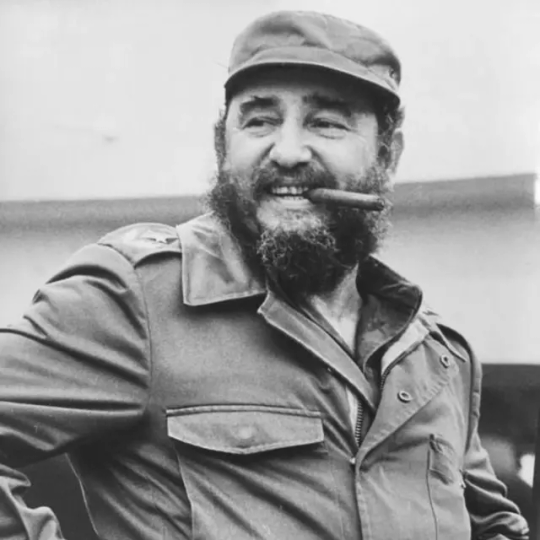
13 notes
·
View notes
Text
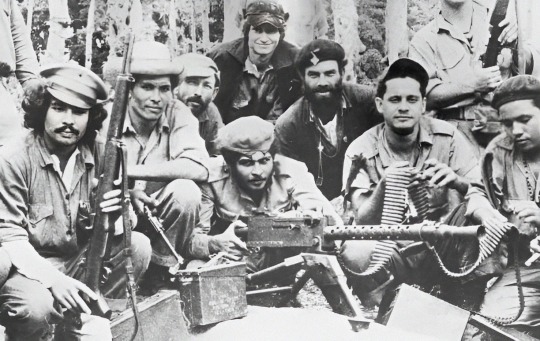
circa 1959: A group photo of Cuban citizen militia displaying weapons captured from dictator Fulgencio Batista's army in Fidel Castro's '26 of July Movement,' Cuba. The men wear army fatigues, posing around a machine gun.
#cuban revolution#1950s#cuba#cuba history#cuban#cold war#guerrillas#fidel castro#freedom fighters#che guevara#revolution#photography#tumblr#black and white#war history#resistance#dictator#batista#militar#caribbean#español#La revolución cubana#history
50 notes
·
View notes